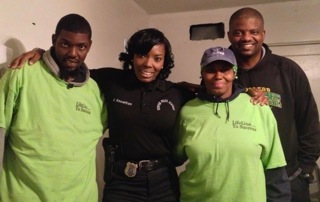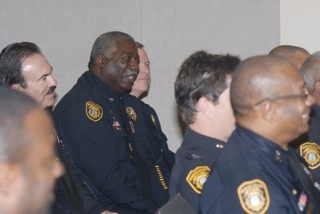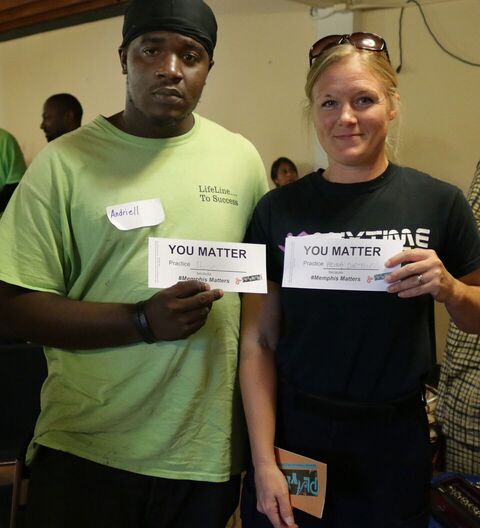Matt Timberlake is a Memphis communications consultant and one of our favorite writers. His contributions to the blog are always appreciated and are widely read, such as his last post, 98.4% Awesome: Stopping Racism, which went viral. This post is a reminder about the impressive, inspirational work of Playback Memphis, a uniquely Memphis resource.
By Matt Timberlake
“We all have a particular narrative in our minds that is driven by the media we ingest, and as a result we can start to see each other not as individual human beings but as representatives of these groups, groups that, because of the public narrative, we can project a lot onto,” said Virginia Murphy, executive director of Playback Memphis. “Playback helps people be human with each other.”
Playback is an inclusive form of public communication, a way to talk openly about deeply personal things. It’s theatre, but there’s no script, no set, no mythical villains or magical heroes. At a performance, the audience offers real stories about their lives, which the actors explore through experimental language and movement. Some stories are funny, some tragic, some preposterous or magical; all of them real and immediate.
While Playback Memphis does perform publicly, with their Memphis Matters series held in the TheatreSouth space inside Cooper Young’s First Congregational Church, they can’t only be called a theatre company. They also apply their methods to community engagements, working with schools and community leaders, and have partnered with large corporations and well-funded non-profits, bringing the Playback method to the board room.
Now, in collaboration with Lifeline to Success and the Memphis Police Department, Playback Memphis has brought police officers and people who have been through the criminal justice system together for open dialog and real human to human connecting.
Performing the Peace
“The vision was to bring together police officers and members of communities that have historically had tense relationships and mistrust with police,” Murphy told me. “We wanted to invite people to reflect on what they saw as the barriers to community/police relations.”
Playback found almost immediate enthusiasm from the MPD, whose administrators were keen on polishing the department’s image and strengthening relationships in Memphis neighborhoods. And after a false start with one citizens’ advocacy group, they found another perfect partner in Lifeline to Success, a Mid-South non-profit that helps people reestablish their lives after release from incarceration.
Officer Joy Knowlton, a 13 year veteran of the force, was an early advocate from within the MPD, having experienced Playback and its therapeutic potential. It was her job to find officers to fill their half of the program.
“Officers have atypical emotions,” said Knowlton. “And they don’t share these emotions. I asked for volunteers but eventually had to get people assigned by their superiors.”
Beginning in September, the officers and previously incarcerated citizens met a couple times a week, training in the methods of Playback theatre, first separate from each other, but joining into one group for the final eight sessions.
Knowlton said both groups were anxious as the time to merge the sessions approached. “The ex-offenders have some shame, some fear of judgment,” she said. “But the police feel it, too. ‘Do they think I’m part of the stories in the news about police officers that made bad decisions in the line of duty?’”
“The communication started slowly,” said Knowlton. “But pretty soon, we’re all talking about life and finding the common stories.”
Last Day of Class
I’m a Playback board member, and have seen more than a few of their public performances, but when I was asked if I’d like to attend the final Performing the Peace session, I lept eagerly.
In a second floor studio space inside First Congo Church, a group of Memphians gathered, exchanging hugs and handshakes, and asked each other about their families. Typical of a Memphis gathering, the group was split evenly between black and white, and typical of a Memphis gathering, they were all happy to see each other.
“I’m happy, but also a little sad, because I like this. I really do,” said Clayborne Taylor. “This journey in my life… I have enjoyed this.”
“Communication is letting out the bad stuff to make room for a happy heart,” said Lakita Dickerson. “I listen differently now. I’m listening for your one true point. This is important for officers but also for felons. It’s where change starts. Real communication.”
Karen Lesley nodded her affirmation. “We’ve created a report with each other that will carry onto the streets,” she said. “I never thought I would say that. I kind of have a peace about me now. I don’t feel as overwhelmed anymore, thanks to Playback.”
After a year of national headlines about armies of armored enforcers and mobs of unruly citizens waging inevitable war on the streets, Performing the Peace stands in defiance to that narrative, and the participants know it. There was an undercurrent of pride and revolt in the language they used during the two-hour workshop. There wasn’t any mention of us and them, we and y’all. Instead they used words like openness, understanding, friendship, trust.
“This kind of communication increases trust, which increases health. Personal health and a community’s health,” said Richard Rouse. “It teaches us to see people as individuals. It’s not a group of this, that, or the other. It’s friends, neighbors.”
Mr. Taylor took the thread further. “Being able to listen to an individual instead of listening to my thoughts about that individual.”
“People you live with, your spouse, girlfriend, your parents… they ask ‘What did you do today?’” said Albert Howard. “And you say: ‘I went to work, and I had lunch with the police.’”
The entire room roared with laughter, in on the joke.
“But that’s rare in our community,” said Ms. Dickerson. “It’s shocking to people.”
“Well, you’re writing a new narrative,” Virginia Murphy offered.
The session ended, but nobody left. They stayed, laughing and talking, lingering together.
“It’s easy to disconnect the people from our work,” Officer Knowlton told me a few days later. “We answer calls so much, and it just becomes our job, the work we do. Playback reconnects the human in the uniform to the humans experiencing crisis or trauma. It stops being about answering a call and becomes about helping people.”
“An officer experiences more trauma in a month than many people do in a lifetime,” she said. “This trauma creates a barrier, layers of emotional protection. But through Playback, you reconnect to the human side of people.”
“In my perfect world, every officer on the force would experience Performing the Peace,” she said. “When I think about how it felt to reconnect with that human factor, it makes me think about what that could mean for this city.”
Playback Memphis is racing to meet its fundraising goals by the end of 2015, which, if reached, will allow the company to engage more Memphians through Performing the Peace. Funding will also allow them to expand their other programming, like Be the Peace, their anti-bullying program which has reached over 500 Shelby County students through Creative Life, Inc. and KIPP Collegiate Middle School.
***
Join us at the Smart City Memphis Facebook page for daily articles, reports, and commentaries that are relevant to Memphis.






Very inspiring. I’ve been to several of their public performances and each time, was moved to tears by an audience member’s story that the troupe brought to life in a poignant way. This is a great use of their talents and a very uplifting and timely piece.